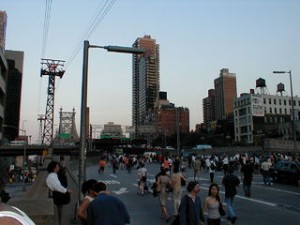Web Doomsday: What Will Happen if The Web Just Disappeared? no comments
On an evening two weeks ago, a power-cut in Southampton plunged the city into darkness. As much of the city’s buildings lost power, people started wandering out onto the streets. Despite the power cut lasting no longer than 30 minutes, there was a faint air of panic as everyone was reminded of how much they have come to be dependent on electricity. I was one of them – living in a modern flat, no electricity means no lighting, no cooking facilities and no running water – the basic amenities of modern life.
But I was also reminded that the Web is just as vulnerable. Much like electricity, the web has become something we are dependent on. And like electricity, the complex infrastructure that delivers Internet to our homes is prone to disruption through countless ways. The Southampton power-cut was caused the failure of a single substation. Likewise, the failure of a single point on the Internet infrastructure can cause huge disruption. The reasons may be accidental or malicious.
Above: People walk the streets of New York during the 2003 blackout. It was caused by a software bug and affected 55 million people, lasting almost a day for some and over two for others.
So over the next few weeks, I am going to consider what might happen if the web were to disappear. Given that there is still over half the world’s population to start using the Web, it seems an appropriate time to why this is and whether this impacts their lives. For example, the widespread political issues surrounding web availability, such as restrictive firewalls and censorship, could provide insight into how loss of access to the Web affects us already.
Literature in Social Anthropology can tell us how humans have historically dealt with loss of perceived necessities, whether it be wartime rationing or survival during and after natural disasters. Perhaps this can help us prepare for a disaster that leads to the loss of the web. And if we did lose the Web, what would the impact be? Modern civilisation is governed through Economics, which, considering how the Web has become a platform for economic prosperity, could be one of the most affected areas.
The uptake of the web is not stopping any time soon, and the loss of the web could be detrimental to a future society. Now is an important time to get a better understanding of what the consequences of loosing the web would be.
